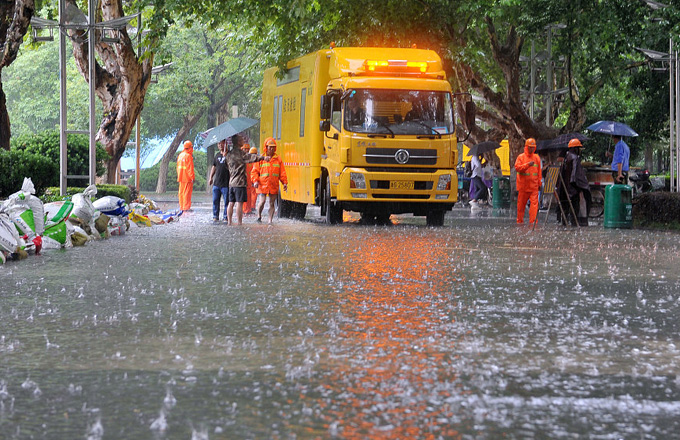Some comments on industrial development
August 18, 1975
A good number of questions have been raised in the document drafted by the State Planning Commission. This document is necessary. Comrade Mao Zedong has long said that we must have regulations. Only through regulations can the Party's principles and policies be given substance. The earlier ``Seventy Articles on Industrial Work'' are basically sound and should be revised rather than revoked. After revision, they can be distributed for discussion before being implemented. Now, I would like to make a few comments on questions concerning industrial development.
1. We should establish the concept that agriculture is the foundation of the national economy and that industry must serve it. A major task for industry is to support agriculture and promote its modernization. Industrial regions and cities should help the surrounding rural areas to advance, develop small-scale industries and improve agricultural production, and this should be included in their plans. Many of the ``third line'' factories, which are dispersed in the countryside, should also help the local people's communes and production brigades and teams with their agricultural production. A big factory will be able to help the entire surrounding area. There is another advantage to such help: the local commune members will respect the property of the factory concerned and will not casually take things away from it. Agricultural modernization is not confined to mechanization alone; it also includes the application and development of science and technology. Cities could help rural areas set up mechanized poultry or pig farms. On the one hand, this would help raise the income of the peasants; on the other it would improve the supply of non-grain foods to the cities. If our workers do not have enough meat and vegetables to eat, how can industry do well? Industry should support agriculture which, in its turn, should support industry. This is a matter of reinforcing the alliance between the workers and peasants. I have written a letter to comrades in Sichuan Province telling them that the more industry is developed, the more we should adhere to the principle of giving first place to agriculture.
2. We should introduce new technology and equipment from other countries and expand imports and exports. Foreign countries all attach great significance to the introduction of new technology and equipment from abroad. Take their products apart, and you'll find that many parts or components are also made abroad. We should import some of the raw and semi-finished materials which for the moment we cannot provide ourselves. If a chemical fibre factory cannot go into operation for lack of certain chemical raw materials, what else can we do but import them? In order to import, we must export more. This involves our export policy. What are we going to export? We should strive to produce more petroleum and export some where possible. Traditional exports like art products should be increased by every means. We should also consider the export of chemical products and coal. In the case of coal, we may consider signing long-term contracts with other countries to import their mining technology and equipment and pay them back with coal. There are many advantages to such an arrangement: it will enable us, first, to expand our exports; second, to bring about the technical transformation of the coal-mining industry; and third, to absorb more of the labour force. This is a major policy which should be carried out after approval by the central authorities. All in all, we should strive to expand exports in exchange for high-grade, high-precision, advanced technology and equipment so as to speed up the technical transformation of our industries and to raise the productivity of labour.
3. We should strengthen the scientific research work conducted by enterprise. This is a valuable means of developing industry with greater, faster, better and more economical results. With the growth of industry, the number of scientific and technical workers in enterprises should rise, representing an ever larger proportion of their total personnel. Big factories should have their own independent scientific research organs; small ones may conduct scientific research either according to unified city-wide plans or through joint efforts with other factories. At present, a number of intellectuals have been assigned jobs that do not correspond to their training and thus their expertise is largely wasted. We must improve our work in this respect. There are many subjects for scientific research. In my opinion, even the packaging of export commodities calls for serious study -- not to mention other matters. We should also study how to lighten the equipment of our troops. With regard to some items, this question cannot be tackled by the General Logistics Department alone, but must be solved through the concerted efforts of several research institutions.
4. We should bring order to industrial management. It appears that industrial enterprises have many problems, two of the commonest being poor management and the poor condition of a high proportion of equipment. These problems are especially evident in heavy industry. We should consider concentrating our efforts in November and December this year on improving industrial management and the maintenance of equipment, so as to lay a sound foundation for next year's production. In enterprises where equipment is in gross disrepair, the emphasis should be on repair. We must keep equipment in good order even at the expense of reduced production. Otherwise, as the saying goes, ``More haste, less speed'' -- the more we are in a hurry, the less production will be raised. The waste in some enterprises is appalling. And it is a common phenomenon. This situation should be rectified so that the enterprises may hand in more profits to the state. Industrial management is a vital issue and it must be handled well.
5. We should emphasize the quality of products: ``quality first'' is an important policy. It also involves the varieties and specifications of products. The best way to economize is to raise the quality of products. In a certain sense, higher quality means greater quantity. Only if quality is improved can more outlets for export be found and exports be increased. To be competitive on the world market, we must spare no efforts to improve the quality of our products.
6. We should restore and improve rules and regulations. The key here is to set up a responsibility system. In many places now we often find that there is no one who takes responsibility for the work, and we have to make special efforts to grapple with this problem, since bad old practices die hard. We should enforce rules and regulations more strictly. And we must be bold and not be afraid of making mistakes or of being criticized. If we aren't strict, we won't be able to restore essential rules and regulations, and consequently the chaotic situation in enterprises will not be changed. We have a summary of the remarks made by a veteran worker from the Nanjing Radio Factory on the necessity of rigorous enforcement of rules and regulations. This material can be circulated for you all to read.
7. We should adhere to the principle, ``to each according to his work'', which has always been an important one in socialist construction. All of us should give some thought to it. Until now, we haven't resorted much to so-called material incentives. But people's contributions do differ. Shouldn't there, therefore, be differences in remuneration? All are workers, but some people have greater technical competence than others. Shouldn't they be upgraded and given a higher wage? Shouldn't the pay for technical personnel be raised also? It may appear that all are equal if everyone makes 40 or 50 yuan a month, no matter whether his contribution is great or small, his technical competence high or low, his ability strong or weak, his job heavy or light. However, in fact this practice does not conform to the principle, ``to each according to his work'', so how can it encourage people's initiative? As I see it, people who work in high temperatures, high above the ground or down in the mines, or do jobs involving poisonous materials, should be paid differently from those doing ordinary types of work. The issue of wage policy is a very complicated one and needs to be studied.
(Remarks at a State Council meeting to discuss the document ``Some Questions on Accelerating Industrial Development'' drafted by the State Planning Commission.)
(From Selected Works of Deng Xiaoping, Volume II <1975-1982>)
- China issues guidelines to develop 'all-for-one' tourism demonstration zones
- Torrential rain triggers disaster in Southwest China
- Harvest time for wheat reapers in Shanxi
- Over 200 couples marry in Changchun group wedding
- Calligraphy tops other icons of Chinese culture, WeChat data shows

























